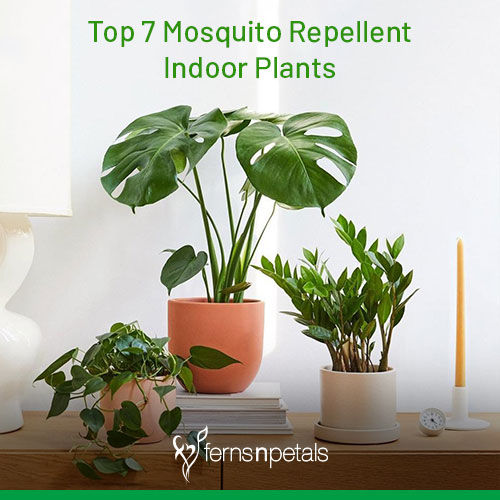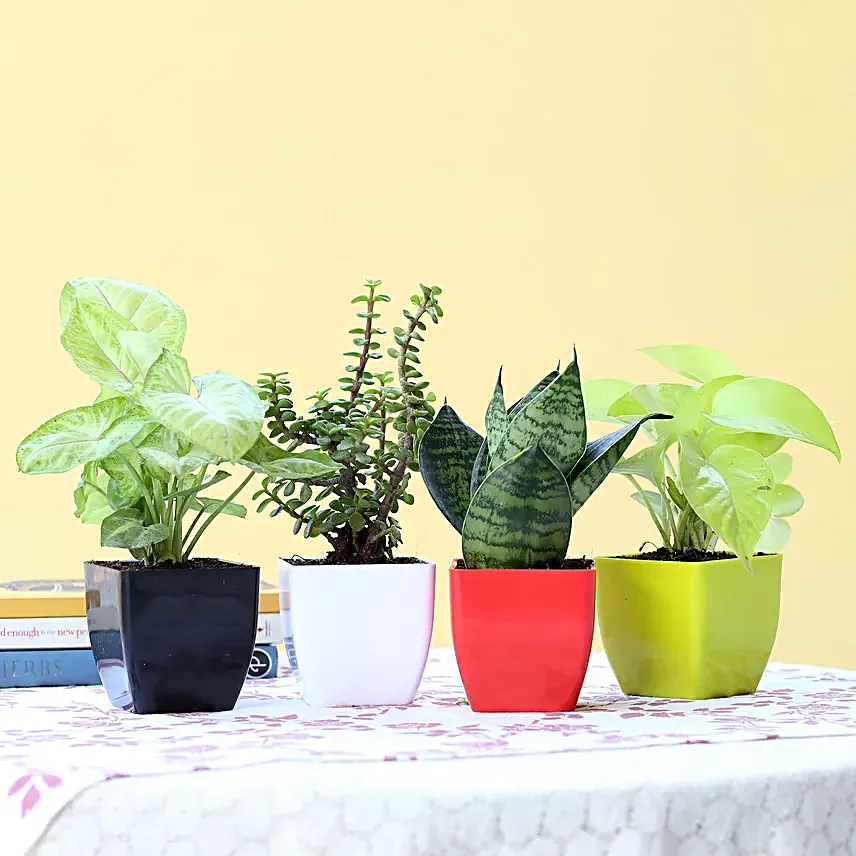Top 7 Mosquito Repellent Indoor Plants
- Author: Shivangi Published: 11th Jul, 2025
No longer bound by the rhythm of seasons, mosquitoes have become perennial intruders, slipping through window cracks, nesting in forgotten corners, and turning the calm of our homes into theatres of unrest. The usual defence? Chemical sprays that cloud the air with harshness, offering fleeting peace at the cost of our breath. But beyond the haze lies a gentler remedy, one born of earth and sunlight. Imagine plants, not merely ornaments, but fragrant sentinels, guarding your spaces with quiet elegance. These are the indoor plants that keep mosquitoes away, nature's own protectors wrapped in green. With every leaf, they whisper protection; with every bloom, they invite calm. Let us wander through this sanctuary of seven green guardians that blend beauty with purpose.

Lemon Balm (Balm Mint): The Whispering Lemon-Scented Watcher
Lemon Balm carries within its tender leaves the essence of citronellal, a natural mosquito repellent. Its fresh, citrusy fragrance fills the air with a lightness that mosquitoes dare not breach.
How to use:
Place this anti-mosquito plant indoors near your windows or your kitchen shelf. As sunlight brushes past, it releases a refreshing perfume that soothes your senses but repels pests.
Care tips:
It flourishes with partial sunlight and regular watering. Take care not to drown its roots, like all living things, it thrives in balance.
Among the best mosquito repellent indoor plants, Lemon Balm is gentle to nurture and a delight to behold.
Catnip (Nepeta Cataria): The Soft Defender With a Fierce Heart
Catnip's power lies in nepetalactone, a naturally occurring compound proven in studies to be more potent than DEET. It does not just repel mosquitoes; it holds sway over other insects as well.
How to use:
Set Catnip near doorways or living areas. It keeps the air pure and the bugs out, serving both protection and aesthetics.
Care tips:
This anti-mosquito plant thrives in sunny spots and well-drained soil. Let it enjoy a drier life, and it shall bloom in gratitude.
For those looking for indoor plants that repel mosquitoes and bugs alike, Catnip is a green jewel of immense worth.
Lemongrass (Cymbopogon): The Fragrant Sword of the Tropics
Within its tall, graceful blades, lemongrass holds the fabled citronella oil, a natural essence long revered as a mosquito deterrent.
How to use:
Grow it in a large pot near your balcony or home entrance. Its strong aroma will form an invisible barrier that mosquitoes dare not cross.
Care tips:
Lemongrass thrives in ample sunlight and well-drained soil. Treat it as both ornamental and herbal, and it shall bless your home twice over.
This is a fragrant tea companion and a kitchen friend.
Mint: The Cool-breathed Trickster
The secret lies in menthol, the intense aromatic oil that mosquitoes find offensive. Its crisp, clean scent is invigorating for humans but unbearable for pests.
How to use:
Place Mint in pots around the kitchen or lounge. Let its fragrance swirl through your home, keeping both mosquitoes and dull air at bay.
Care tips:
Mint loves moist soil and gentle, partial sunlight. It grows with glee, often spreading faster than expected.
Among the most versatile indoor plants to keep mosquitoes away, Mint doubles as a culinary delight.
Rosemary: The Fragrant Flame of the Old World
Rosemary's woodsy, pine-like aroma acts as a scent shield, veiling your presence from mosquitoes and flies.
How to use:
Set it by open windows or doorways. Its fragrance acts like a natural curtain, silently guarding your space.
Care tips:
This herb needs full sunlight and minimal watering. Treat it like a desert sage, sparingly fed, often admired.
As one of the finest indoor plants that repel insects, Rosemary wears the cloak of utility with the elegance of an ornament.
Lavender: The Lavender Siren With a Heart of Stone
Though known for calming humans, Lavender emits a floral perfume that irritates and repels mosquitoes. A paradox of serenity and strength.
How to use:
Grow it near sunny windows or indoor patios where it can bloom in full light. Though delicate in appearance, it is a fierce mosquito repellent.
Care tips:
It prefers dry, well-lit conditions. Let the sun kiss its purple blossoms daily.
Although often grown outdoors, Lavender easily qualifies as one of the best mosquito repellent indoor plants when given the right care.
Basil (Tulsi): The Sacred Flame of Every Indian Home
Basil, or Tulsi, emits a powerful aroma that drives mosquitoes far. It is both a spiritual protector and a practical one.
How to use:
Place Basil pots on window sills, kitchen corners, or just inside doorways. Its leaves purify the air and repel pests at once.
Care tips:
Basil thrives in bright sunlight and needs daily watering. It asks for discipline and rewards with vitality.
This mosquito repellent indoor plant offers more than safety, as it brings holy energy and fresh leaves for your meals.
Why Choose Indoor Plants to Repel Mosquitoes?
Beyond their obvious beauty, indoor plants for mosquito control provide a long list of benefits that no chemical spray can offer.
- Chemical-free Protection: They safeguard your home without adding toxins to the air.
- Natural Air Purifiers: These plants breathe in what we cannot and exhale purity.
- Aesthetic Charm: They dress our interiors in life and fragrance.
- Safe for Families: Children, pets, and elders, all benefit from their presence.
When you choose indoor plants that repel mosquitoes, you are not just solving a problem; you are enriching your space with nature's wisdom.
Let Your Home be a Garden of Peace
Our homes should be sanctuaries, places where peace reigns, and the air smells sweet. Chemical sprays may offer momentary relief, but nature offers long-term grace. The best mosquito repellent indoor plants do more than keeping pests away. They breathe life into rooms, decorate spaces with green serenity, and bless every breath we take.
So, welcome these anti-mosquito indoor plants into your home. Let their silent fragrance form invisible shields. Let your home be a living, breathing garden of peace.
FAQs
Q.1 What are the best mosquito repellent indoor plants?
Ans: Some of the best mosquito repellent indoor plants include Citronella, Lavender, Basil, Mint, and Rosemary. These plants emit natural aromas that mosquitoes dislike, making them effective for use near windows, corners, or living areas to reduce mosquito activity indoors.
Q.2 Do indoor mosquito repellent plants grow well in low light?
Ans: Yes, many mosquito-repelling indoor plants like Mint and Lemon Balm adapt well to low-light conditions. While they thrive best in moderate sunlight, they can still be effective in shaded indoor spaces.
Q.3 Are there indoor plants that repel both mosquitoes and bugs?
Ans: Absolutely! Plants such as Basil, Peppermint, and Marigold not only repel mosquitoes but also keep common bugs at bay. These multi-purpose indoor plants add greenery while acting as natural insect repellents.
Q.4 How do I care for indoor plants that repel mosquitoes?
Ans: To care for these plants, place them in areas with adequate light, use well-draining soil, and water them moderately. Avoid overwatering, and prune regularly to maintain plant health and effectiveness in repelling insects.
Q.5 Are mosquito repellent plants safe for pets and children?
Ans: Most mosquito-repelling plants are safe, but some, like Citronella, can cause mild irritation if ingested. Choose non-toxic options like Catnip and always place plants out of reach of pets and young children for added safety.
Q.6 How often should I water mosquito-repellent indoor plants?
Ans: Watering once or twice a week is usually sufficient, depending on the plant type and humidity levels. Ensure the soil remains slightly moist but not soggy, and adjust the frequency based on the plant’s needs and seasonal conditions.





